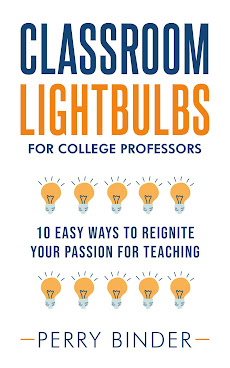At some point in your business career, the shift will come from
you being a mentee to a mentor. Below are some of the most experienced
college professors and their tips on managing groups and how to engage
with young people while encouraging them to not give up and instead
figure out paths to success.
Diana S. Barber “I
use numerous techniques to stay engaged with students, including
intelligent agents that will automatically send email messages to
students if they miss a quiz or assignment, as a reminder that I am
available to assist and that their success is important to me.”
Jordan (Jody) Blanke “I
like to teach by example. I think it is much easier to understand an
idea if you can see it in action, rather than merely in the abstract.
Quite often you can discuss the nuances of the topic by simply varying
the facts of the example.”
Yelena Abalmazova Chan “Encourage
students to explore all careers, classes, and topics that interest
them. I really believe it’s a duty we have as instructors. I see some
students tied to a major just because that’s what they chose based on
pretty much no research or experience, and they clearly have no passion
for it. There is nothing wrong with majoring in accounting but consider
interning at a bakery if that’s something that piques their interest.
Sometimes hearing that from an authority figure like a college professor
is encouraging and gives students the permission to explore outside the
box.”
Evaristo Fernando Doria “I
am enthusiastic about expanding my efforts to create more cross-border
interdisciplinary learning experiences. Such experiences not only prompt
participants to critically analyze novel ideas and challenges but also
encourage them to delve into the intricate intersections of various
fields of study while developing their global mindset.”
L. Gregory (Greg) Henley “It's
very important that I reach the students on their level. If I can get
their attention, then I can teach them. Improving my teaching requires
that I get constructive feedback to ensure that what I'm doing is
working.”
Leila Lawlor “If
you have chosen to teach, you have chosen to place students at the
center of your professional universe. Tell them. They will appreciate
knowing how much you want them to thrive, to enjoy your teaching, and to
meet their academic and professional goals. As you get to know your
students, they will surely appreciate your interest in their lives and
goals.”
Laura E. Meyers “Unlearn.
We need to deconstruct what we know and consider how we learned this
and who it favors. Unlearning is one way to reduce bias and, in turn,
harm. Unlearning can lead to allyship (and more) which is beneficial to
our students (and us) in ‘becoming’ educators. Aren’t we always growing
and becoming?”
Isabelle N. Monlouis “Students
need to learn how to fail forward. Learning to fail and learning from
failure, with no loss of enthusiasm. Trying again, knowing this time,
you are trying with the benefit of experience so you will be more
successful. ... And we need to learn how to teach without penalizing
‘failure’ but instead recontextualizing it as gathering valuable
information to make their next attempt more successful.”
Benita Harris Moore “If
you are offered a new responsibility that is not ‘pure teaching,’ be
open to it. The new opportunity may or may not take you from the
classroom but may open doors that are different than you could have
imagined. Don’t be afraid to accept these opportunities. My 40+ years in
education was enhanced because I said “yes” to opportunities that were
presented to me, even if the new challenge was outside of my comfort
zone.”
Carol Springer Sargent “My
most popular technique to this day was the result of a learning
experiment with a struggling student. … I asked him if he would just
give me the commercial breaks during Law and Order. (his favorite show)
He agreed. I created three-minute coaching videos that taught a core
idea in each video. I focused on one foundational idea that, if missed,
would make the rest of the chapter impossible. The ‘just three minutes’
was a wild success.”
John P. Thielman “I
make sure not to recycle my exams and that they are always up to date
on the current textbook and current law. The trick I use to discipline
myself to do this every semester is to use the current students’ names
in the test questions. This keeps the tests current, and the students
get a thrill out of seeing their names on an exam question.”
Paul Ulrich “Encouragement
of students is essential to my approach. I tell my students that I have
greater confidence in their potential than they have in themselves, and
I call them to rise to the challenge. For non-science students, I
actively break down the lie that they are ‘just not good at science’.”
Marta Szabo White “Be
OPEN – Organized, Passionate, Energetic, Nice. I honestly knew these
characteristics to be important even when I first started. Now I know
how truly pivotal they are.”
And finally, from the author Make
your classes interactive with activities solving real world problems.
Encourage students to be confident in their fact-based opinions and
continually challenge or “teach the teacher.” For example, in my
Internet Law class, students know more than me about emerging
technologies such as AI, blockchain, crypto, and NFTs. While I can teach
the legal limits of technology, it is the energy of students which
carries this class, as they educate me. This shift in roles grew my
skills as a college professor. Ultimately, I want my classes to not only
be student-centered but life-centered as well.
Excerpt, Innovative College Teaching book

















.jpg)